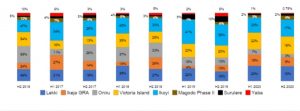The country’s foreign reserves have been under pressure in face of dwindling oil earnings and reduced capital inflows from risk-averse foreign investors. The decline in oil prices was largely driven by weakened crude oil demand, the global pandemic and the oil price war between Russia and Saudi Arabia. The external reserves have been $32 to $38Bn for the past 11 months. Following the crash in global oil prices, Nigeria began to face significant FX shortages which forced the Central Bank of Nigeria (CBN) to limit interventions in various windows. The supply of the vaccine and a restructuring of the creation and delivery of economic value is expected to revive the economy starting Q2. Trade is also expected to grow.
Underpinning many market movements has been the realisation that landlord and tenant interests are more closely aligned than ever. Occupiers are faced with reductions in revenues that will extend into 2021 and have reduced space demand and reached out to landlords for concessions. The best landlords have tried to be sympathetic even if it’s on a case by case basis. This has led to increased transparency on both sides, one of the good things to come out of 2020; a year that has forced forward the conversations around market flexibility, collaboration, disruptive technologies and regulator efficiency.

It may take time for change to spread. There are structural constraints that have overstayed their welcome. Asset management under new rules will be central to positive yields in 2021; technology and embracing disruptive service delivery models will be key. The structural changes prior to the emergence of COVID-19 are likely to continue. The office market will lose some ground residential, which is growing at the mid-market due to the demand for 1 and 2 beds. Short stay is projected to expand, taking some market share from big brand hotels and luxury apartments. Retail is expected to be most active at the neighbourhood state as the Grade A service providers tweak their model. Healthcare is unlikely to fall from its ascendancy but will continue to require patient capital.
Adjustment in the investor market has led to a revision of mid and long-term strategies, transactional activity, development objectives and refinancing requirements. There are also conversations around managing the emerging pandemic cycle of lockdowns and releases and their effect on property values. Each of these revised considerations, together with the time horizon for the global deployment of effective vaccines and treatments, will inform forward-looking investment strategies and return expectations. The outlook for retail remains downward, save swift changes to operational models reflective of reduced footfall. Logistics is on the ascendancy, are is some concern around the future demand and use of office space.
Conclusion
Investing successfully in Nigeria’s real estate market boils down to three things – access to capital for adequately identifying and financing the best projects, strong industry relationships for access to opportunities and a clear understanding of systems. Lenders need significant capital to finance high-quality, sophisticated borrowers who themselves have access to extensive capital.
Ayo Ibaru MRICS, ANIVS
COO/Director of Research
+234 818 518 6975
ayo.ibaru@northcourtrealestate.com
@ayoibaru
Tayo Odunsi FRICS, RSV, ANIVS
CEO
+234 802 325 0289
tayo.odunsi@northcourtrealestate.com
@tayoodunsi
